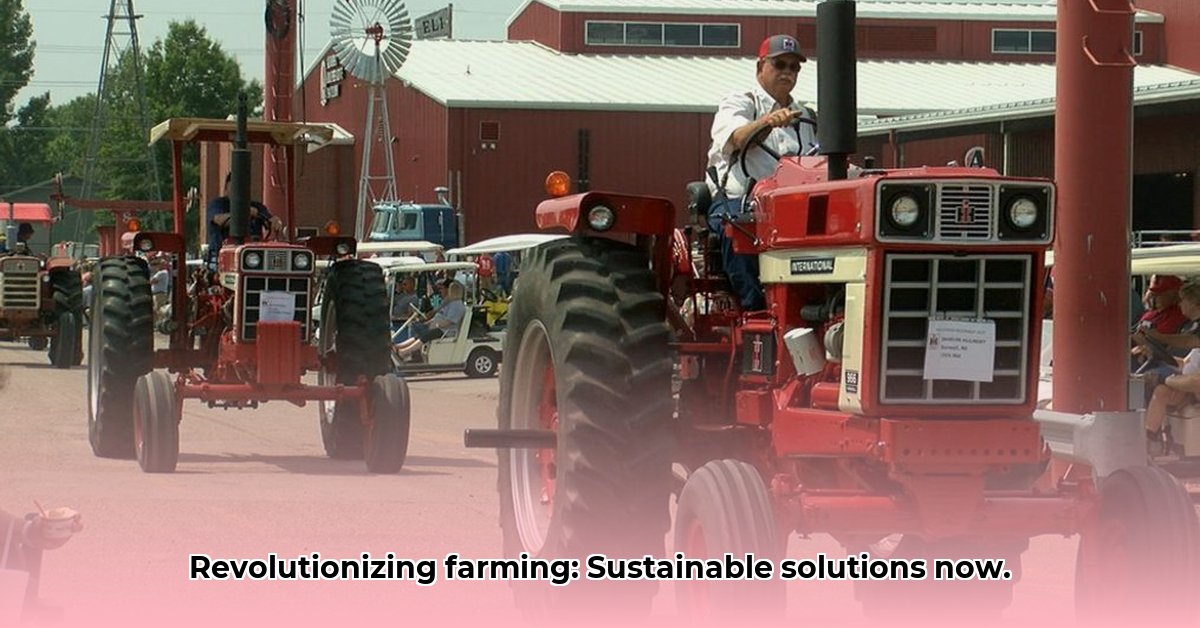
The iconic red Case IH tractor—a symbol of American farming ingenuity—represents more than powerful machinery; it embodies a vibrant community of dealers, farmers, and enthusiasts united by a shared passion for agriculture. This community, strengthened by events like Red Power Roundups and online forums such as Red Power Magazine, fuels innovation and the exchange of best practices—essential elements for building a sustainable agricultural future. But how can we harness this collective energy to cultivate a greener tomorrow? For more Case IH resources, check out this helpful site.
Cultivating a Sustainable Future: A Collaborative Approach
Long-term sustainability transcends machinery; it demands collective adaptation and evolution. Case IH dealerships play a crucial role, serving as the vital link between cutting-edge technology and the farmers who utilize it. By actively promoting eco-friendly equipment and practices, dealerships not only help farmers enhance efficiency and reduce their environmental footprint but also ensure their own long-term success in a dynamic market. This creates a triple win: increased yields for farmers, a healthier planet, and thriving businesses.
Practical Steps Towards a Greener Harvest: A Roadmap for Success
Let's examine concrete actions various stakeholders can take to accelerate the adoption of sustainable farming practices. This isn't about complex theories; it's about straightforward, effective steps.
For Case IH Dealerships: Leading the Transformation
Enhance Digital Presence: Clearly communicate your commitment to sustainability. Showcase eco-friendly equipment and services prominently on your website and social media. High-quality visuals of sustainable technologies in action will attract attention.
Invest in Expert Technicians: Training is paramount. Your technicians must be proficient in the latest sustainable farming technologies, from precision seeding systems to efficient irrigation solutions. They are the trusted advisors farmers rely on.
Develop Strategic Partnerships: Collaborate with renewable energy providers. Offering integrated solar or biogas solutions alongside equipment packages will attract environmentally conscious farmers, providing complete sustainable farming solutions.
For Farmers: Embracing Innovation
Leverage Dealership Expertise: Don't just purchase equipment; fully utilize the knowledge and support your dealership provides. Engage in discussions, attend workshops, and take advantage of training opportunities. This investment yields significant returns.
Embrace Precision Agriculture: Precision farming techniques—GPS-guided machinery, variable-rate application of fertilizers and pesticides—optimize resource use, minimizing waste and maximizing yields while reducing environmental impact.
Engage in Community Dialogue: Actively participate in online communities like the Red Power Magazine forum. Share experiences, learn from others, and contribute to the collective knowledge of this thriving network.
For Red Power Magazine: Amplifying the Sustainable Message
Expand Editorial Focus: Dedicate substantial space to articles, interviews, and case studies highlighting successful sustainable farming practices. Feature real-world examples of farmers making a positive difference.
Collaborate with Industry Leaders: Partner with ag-tech companies and research institutions. Sharing their insights and research findings provides readers with access to the latest information and innovative solutions.
For Government Agencies: Fostering a Supportive Environment
Incentivize Sustainable Practices: Offer financial incentives—tax breaks, grants, subsidies—to farmers adopting eco-friendly equipment and practices, making sustainability more accessible and appealing.
Develop Clear Regulations: Implement and enforce environmental regulations aligned with global sustainability goals, creating a level playing field and encouraging responsible agricultural practices.
Invest in Crucial Research: Fund research and development of cutting-edge sustainable agricultural technologies to drive innovation and ensure the long-term viability of the agricultural sector.
Addressing Knowledge Gaps: Future Research Needs
While the potential for sustainable farming using Case IH equipment is substantial, comprehensive data on its market share in the sustainable agriculture sector is currently lacking. More robust data collection on farmer adoption rates for sustainable technologies, along with quantifiable metrics like greenhouse gas emission reductions, is crucial for evidence-based decision-making and demonstrating the real-world impact of these efforts. Continued research is essential to inform future strategies.
The Future is Red: Sustainable Farming, Today and Tomorrow
The red Case IH tractor signifies more than equipment; it represents a legacy of progress and the power of community. By embracing sustainable practices and collaborating—dealerships, farmers, publications, and government agencies—we can create a future where agriculture thrives in harmony with the environment. Let's make this vision a reality.
Implementing Sustainable Farming Practices with Case IH Equipment: A Practical Guide
Key Takeaways:
- Precision tillage, guided by soil health monitoring, minimizes soil disruption and enhances carbon sequestration.
- Autonomous Case IH machinery optimizes resource utilization, reducing fuel consumption and labor costs.
- Data-driven decision-making, enabled by technology, maximizes yields while minimizing environmental impact.
- Participation in carbon credit programs provides farmers with new revenue streams.
- Addressing technological limitations, regulatory hurdles, and farmer adoption challenges is crucial for widespread implementation.
Sustainable agriculture is not merely a trend; it is the future of farming. Case IH is at the forefront, providing the necessary tools and technologies. Let’s explore the path forward together.
Precision Tillage: Nurturing Soil Health
Soil health is paramount in sustainable farming. Precision tillage, enabled by Case IH technology, allows for targeted soil management, minimizing disruption and preserving its structure, thereby reducing erosion, promoting biodiversity, and enhancing water retention. It's akin to surgical precision on a large scale.
Autonomous Technology: Efficiency and Sustainability
Automation maximizes efficiency and sustainability. Case IH's autonomous tractors, guided by GPS and sensors, perform tasks with exceptional accuracy, minimizing fuel consumption and reducing both operational costs and carbon emissions.
Data-Driven Decision-Making: Precision and Optimization
Technology provides valuable data for informed decision-making. Soil sensors, integrated with Case IH equipment, enable real-time insights into soil conditions, facilitating targeted fertilizer application and optimized irrigation strategies, preventing waste and conserving resources.
Carbon Sequestration: Financial Incentives for Sustainability
Healthy soils act as carbon sinks, capturing atmospheric carbon dioxide. Sustainable practices with Case IH equipment contribute to carbon sequestration, creating potential new revenue streams for farmers via carbon credit markets.
Addressing Challenges and Future Research Directions
While the potential is significant, challenges persist, including the cost of advanced technology, the need for improved data analytics, and the development of clear regulatory frameworks. Continued research is needed to overcome these limitations.